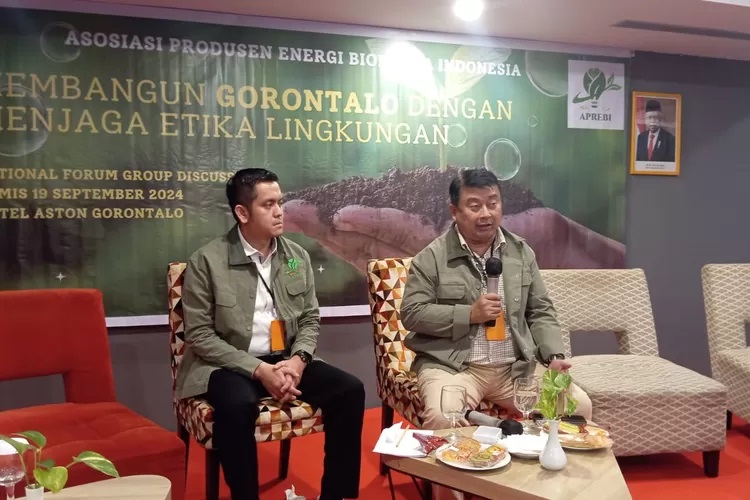News
APREBI Aims to Address Environmental Concerns Over Wood Pellet Industry
WINDONESIA September 29, 2024 APREBI Secretary-General Dikki Akhmar (right) gives a press statement after a national discussion at the Aston Gorontalo Hotel & Villas in Gorontalo City, Gorontalo on Sep. 20, 2024. (hulondalo.id/Syakir)
APREBI Secretary-General Dikki Akhmar (right) gives a press statement after a national discussion at the Aston Gorontalo Hotel & Villas in Gorontalo City, Gorontalo on Sep. 20, 2024. (hulondalo.id/Syakir)
Wood pellet investment in Gorontalo is controversial among environmental activists, who are worried that the investment will bring disaster instead of welfare.
These concerns were sought to be addressed in a national discussion with the Indonesian Biomass Energy Producers Association (APREBI) on Sep. 20, 2024. Gorontalo Province Acting Regional Secretary Haris S. Tome, members of the Environment and Forestry Ministr, academics, student activists, and environmental activists were present at the event.
APREBI Secretary-General Dikki Akhmar said that the regional government is currently intensively implementing programs to improve the economy, education, and health. The presence of investment, especially biomass investment in Gorontalo, helps the government realize these programs.
However, Dikki claimed that the idealism of environmental observers who want no logging has slightly hampered the pace of investment in the region.
"That is the importance of today's discussion. It is to harmonize it [the industry and civil society]. We bring in a professor who is an expert in bioenergy and a member of the Environment [and Forestry] Ministry, to explain what is feared about the environmental risk. Insya Allah it will not happen," Dikki said.
As an example, wood pellet businesses BTL and IGL must comply with forest management procedures. If there are violations, he asserts that all parties, including forestry association, will definitely take action.
"APREBI as an association has the authority to reprimand them, and we can also protect our members," Dikki added.
He hopes that environmental organizations will sit down to discuss and find a solution to their concerns, and not just label the investment as an illegal practice.
"This is not a cheap investment. It takes Rp1 trillion to Rp2 trillion in capital to develop in its industry. Hence, they (the investors) must maintain the continuity of their business. Of course, they will also adress environmental, social, and community issues," Dikki emphasized.
The APREBI Secretary-General referred according to the Gorontalo Province's explanation in the discussion earlier that the wood pellet industry must deposit Rp44 billion to the government that would become its non-tax revenue, of which 60 percent of which is returned to the region it comes from.
That 60 percent is split into half for the Gorontalo province and half to the region where the industry operates from. Additionally, of the total 1200 employees needed by the wood pellet industry in Gorontalo, 90 percent are recruited from local residents.
"I heard stories about how companies continue to provide educational training, even though the workers recruited are inadequate in terms of experience. That is part of their commitment," Dikki claimed.
Furthermore, the companies have corporate social and environmental responsibility (CSER), including the provision of health insurance through Workers Social Security Agency (BPJS Ketenagakerjaan) as well as Health Care and Social Security Agency (BPJS Kesehatan) for employees and their families.

